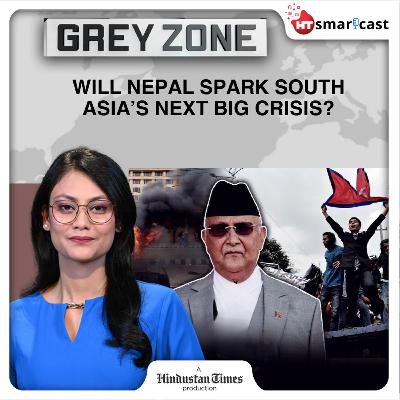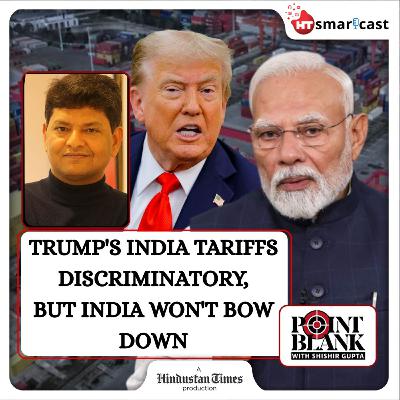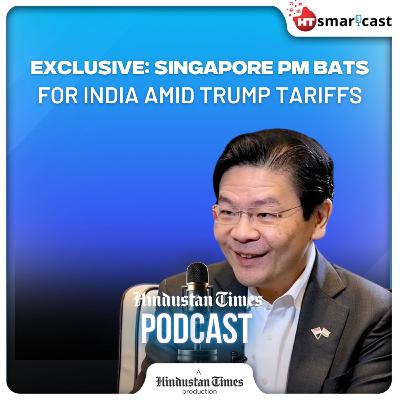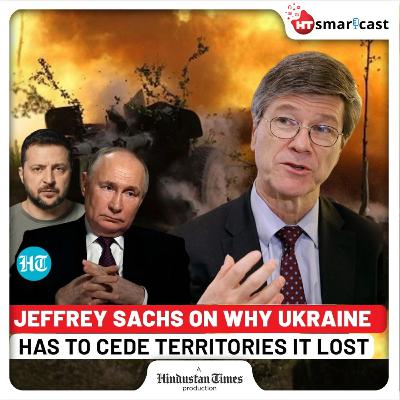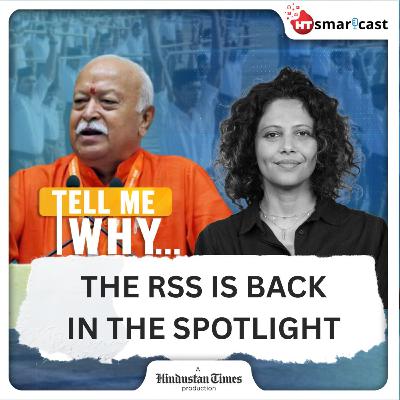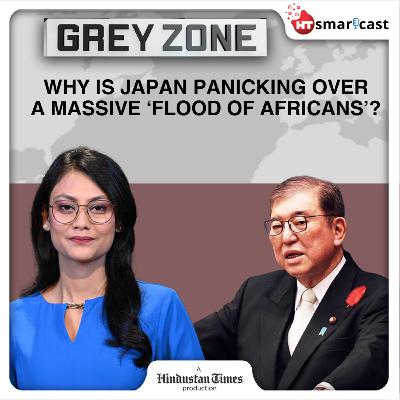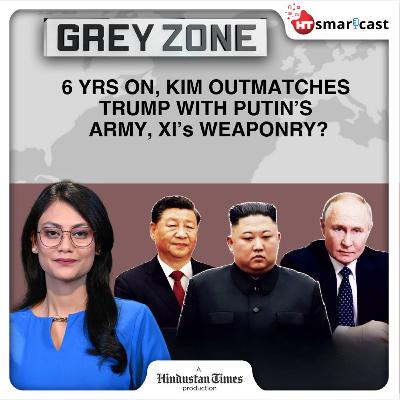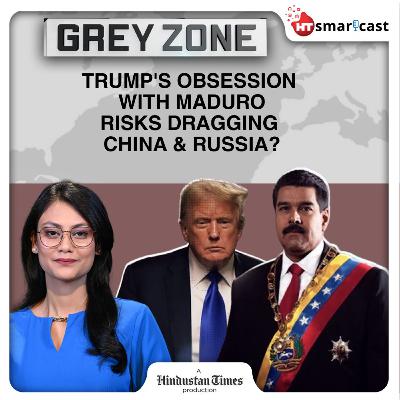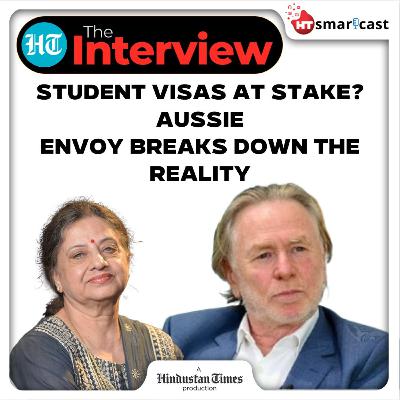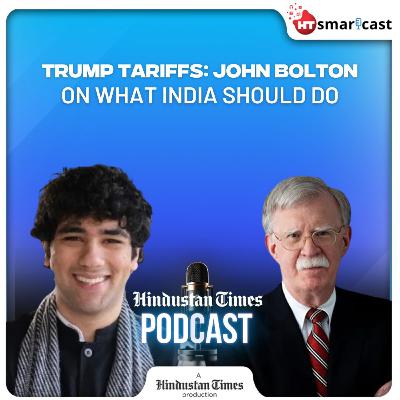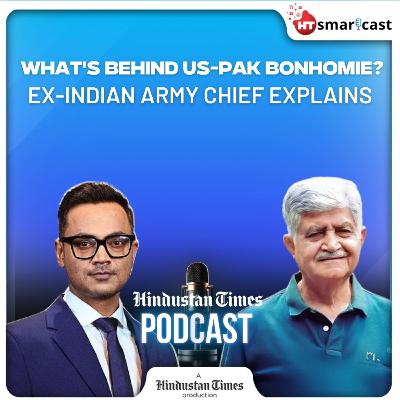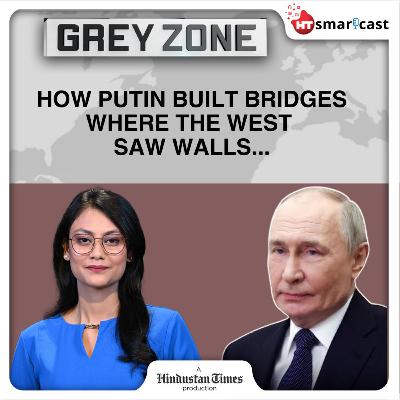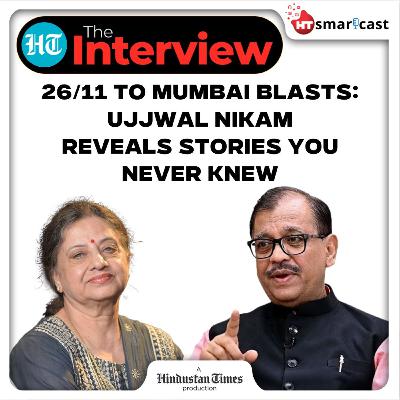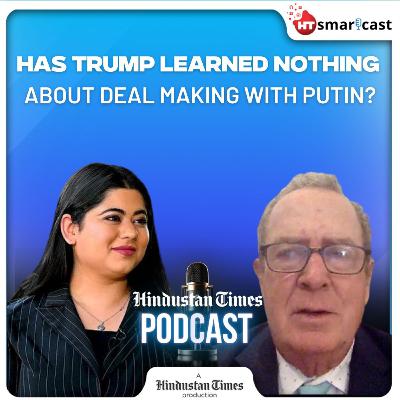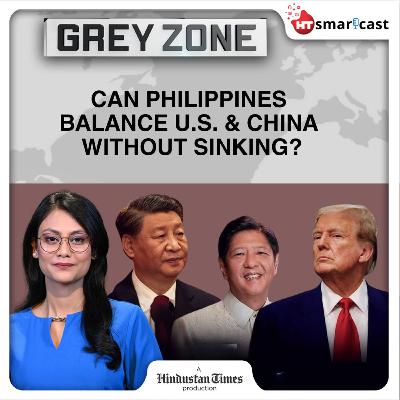Discover Hindustan Times Podcast
Hindustan Times Podcast

Hindustan Times Podcast
Author: HT Smartcast
Subscribed: 4Played: 29Subscribe
Share
© HT Smartcast
Description
Hindustan Times Podcast brings you big-ticket interviews and in-depth explainers on current affairs and geopolitics. Stay updated on politics, business, economy, technology, and global events with expert analysis, exclusive interviews, and insightful commentary.
We deliver credible, fact-based narratives using cutting-edge storytelling for a 360-degree perspective on key issues. Subscribe now to stay ahead and never miss an update!
We deliver credible, fact-based narratives using cutting-edge storytelling for a 360-degree perspective on key issues. Subscribe now to stay ahead and never miss an update!
109 Episodes
Reverse
Charlie Kirk’s death has sent shockwaves across America, not just because of who he was, but because of the cruel irony of how it happened. The 31-year-old conservative activist was shot dead on stage in Utah, right as he began answering a question about gun violence in America. Hours later, a video from April 2023 resurfaced, where Kirk said it was “worth” losing lives every year to preserve the Second Amendment. Those words now echo with haunting weight, because Kirk himself became a victim of the very violence he once defended as an unavoidable cost of freedom. His killing isn’t just the loss of a polarizing political figure, it forces America to reckon with an uncomfortable truth. Gun violence is no longer an abstract debate of left versus right. The cost is blue and red, both. And with Kirk’s assassination, America’s polarizing conversation on guns has entered a new and darker chapter.Watch on YouTube: https://youtu.be/x16PGIMhyGE
Nepal has been thrown into turmoil. The Prime Minister has resigned after days of violent youth-led protests that began with a social media ban but quickly spiraled into the country’s worst democratic crisis in decades. Streets are burning, parliament has been breached, and police have opened live fire on demonstrators. But this story is much bigger than Nepal. Across South Asia, from Sri Lanka to Bangladesh to Pakistan, youth anger has toppled governments, rewritten politics, and shaken entire systems of power. Is Nepal now the next epicenter of unrest? Could this crisis spill over and destabilize an already fragile region? And most importantly, will the cycle of the same old leaders, from Oli to Prachanda to Deuba, continue to haunt the country despite the demands of a restless generation? In this Grey Zone episode, Ananya Dutta breaks down the resignation, the rage, and what it means for South Asia’s future.Watch on YouTube: https://youtu.be/6SyJ5zWyTWs
Two years into the Gaza war, the battlefield isn’t the only place under pressure. Israel’s Prime Minister Benjamin Netanyahu has launched a fresh offensive while his domestic challenges mount. Protesters are back on the streets demanding answers on hostages, Israel’s Supreme Court has delivered a rare ruling with direct political consequences, and foreign mediators are running out of options. Meanwhile, Donald Trump has stepped into the mix with a “final warning” to Hamas - raising the stakes for both sides. But can words from Washington shift realities in Gaza? Or will the war spill beyond? The future of this conflict may not be decided by rockets or rulings alone, but by the collision of politics, courts, and geopolitics. The question is: which pressure point snaps first, and what happens when it does?Watch on YouTube: https://youtu.be/5fmDqZCduVU
A young IPS officer from Solapur, Anjali Krishna, stood her ground against Deputy CM Ajit Pawar — and the viral video has sparked outrage. But this isn’t just about one clash. In this episode of Tell Me Why, Sunetra Choudhury breaks down India’s VIP culture, outdated 1968 conduct rules, and why officers often end up powerless before netas.#ajitpawar #anjalikrishna #vipculture #tellmewwhy
Prime Minister Modi’s recent China visit and evolving India-US relations spark global debate as President Trump imposes steep tariffs on Indian imports in response to India’s Russian oil purchases, citing these penalties as action against Russia. In this episode of Hindustan Times Point Blank, Executive Editor Shishir Gupta dissects the transactional nature of the current Indo-US ties, India’s approach to China, shifting alliances, Quad’s future, and Trump’s controversial statements. The discussion highlights complexities in modern geopolitics, why India remains pragmatic, and how actions—like tariffs and summit diplomacy—are shaping trade, security, and strategy across Asia.Watch full episode on YouTube: https://youtu.be/C3TcVCFPTEw
Singapore Prime Minister Lawrence Wong, who is currently in India on a bilateral visit, sat for an exclusive interview with Hindustan Times. In the interview, Wong talked about possible outcomes of upcoming India-Singapore bilateral meeting and his country's future investment plans. Wong also asserted confidence in India's economic future amid the tariff war by US President Donald Trump. Watch on YouTube: https://youtu.be/OKjuSprz0Vg
In this exclusive conversation, economist and policy analyst, Professor Jeffrey Sach, joins Abhishek Singh of Hindustan Times to decode some burning geopolitical questions. From the fallout of Donald Trump's meeting with Vladimir Putin in Alaska, to the deeper roots of the Russia-Ukraine war, Sachs pulls no punches in laying out the complex realities behind global conflicts and shifting alliances. On India, Sachs criticizes Washington’s tariff threats and urges New Delhi to think beyond old alliances. Sachs also calls out European leaders for blindly following the U.S.’ lead, warns of further destabilization in Latin America, and offers a sharp critique of American diplomacy under Trump. Watch the full interview for all the details.HT PODCAST#JeffreySachs #Geopolitics #UkraineCrisis #IndiaChina #USIndiaTrade #TrumpForeignPolicy #BRICS #MultipolarOrder #HindustanTimes #UNReform #RussiaUkraineWar #TradeTensions #GlobalPolitics #USHegemony
In this week’s episode of Tell Me Why, we dive into the Rashtriya Swayamsevak Sangh (RSS) — the 100-year-old ideological fountainhead of the BJP and India’s ruling establishment. With RSS chief Mohan Bhagwat delivering a rare 3-day lecture series, we break down the biggest takeaways: Why the Sangh doesn’t want PM Narendra Modi to retire at 75, what it really thinks about Ayodhya, Kashi, and Mathura temple disputes, its controversial stand on meat bans, and how deeply it still influences BJP decisions. From its roots in Nagpur to shaping India’s politics and culture today, this is everything you need to know about the RSS in 2025.👉 Why does the RSS matter? How does it shape Modi’s future? And what does it mean for India’s politics?https://youtu.be/vK7a3cYbA5c
Japan is facing a storm it didn’t anticipate. A government program linked to the Japan International Cooperation Agency (JICA) quietly branded the “Hometown Plan”, has triggered a wave of anger on social media. The fear? That Japan is about to be flooded by African migrants, granted quick permanent residency, and even incentivized to marry into Japanese society. Thousands of posts online are calling this everything from “selling out the country” to “ethnic cleansing.” For a country already struggling with a demographic crisis, immigration is an explosive topic. And while Africa is seeking trade, not aid, Japan’s attempt at building closer ties has backfired at home. The backlash shows how deep-rooted fears about identity, race, and population decline run in Japanese society. So, is this controversy just online hysteria or does it expose a deeper anxiety about the future of Japan?Watch the full episode on YouTube: https://youtu.be/YQI4FutXbY0
Donald Trump says he wants to meet Kim Jong Un again. The announcement instantly revives memories of that dramatic 2019 handshake at the DMZ. But the world Trump is walking back into has changed. North Korea today is not just the isolated state he once tried to charm, it now stands firmly backed by two powerful patrons: Russia and China.Just last year, Vladimir Putin visited Pyongyang, the first Russian president to do so in 24 years. He signed a sweeping defense pact with Kim, pledging mutual military support. In practice, it has meant North Korea sending arms and ammunition to Russia’s war in Ukraine, while Moscow supplies oil, food, and possibly missile technology in return. At the same time, Beijing continues to serve as Pyongyang’s economic lifeline.So when Trump talks about “friendship” with Kim, the question is: will the U.S. walk into a room where Russia and China are already seated at the table? Watch the full episode on YouTube: https://youtu.be/VGQPAv7TCto
Donald Trump is playing up his role as a global peacemaker, but is that the whole story? While Washington talks of ending wars, U.S. warships are circling Venezuela, signaling something far bigger than just cracking down on “drug cartels”. Could this be the start of another regime change war? And where America goes, rivals aren’t far behind. China and Russia are already deeply invested in Venezuela’s oil and politics and that means the Caribbean could become the next frontline in great power rivalry. So, is Trump really pushing peace, or is Venezuela about to become Washington’s next foreign adventure? And more importantly, who stands to gain if the conflict escalates? Ananya Dutta brings you this episode of Grey Zone. Watch the full episode on YouTube: https://youtu.be/mzYitBrq8E0
With Indian students flocking to Australia for higher education, Australia's High Commissioner to India Philip Green decodes the hurdles and practical advice they must consider to ensure their plans remain on track. This as the Australian government plans to increase the cap for international students to 295,000 by 2026. In this special episode, Green offers a rare glimpse into his personal observations, portraying India as a dynamic, complex, and ever-evolving nation.Watch the full episode on YouTube: https://youtu.be/C8fVglZSvP4
In an interview with HT, former Trump national security adviser John Bolton criticized Washington for its “confused” policy on India. Ambassador Bolton questioned Washington’s 25% penalty on India for purchasing Russian energy and acknowledged that the India-US relationship is in “a very bad place”. Bolton believes Trump is an “aberrational president” and that the objective should be to keep the damage to the India-US relationship to a minimum during the rest of Trump’s term. When asked about India-US relations and if they could return to normalcy, Bolton advised that Indian PM Modi and Trump should have a one-on-on and "clear the air." He also commented on Trump's policy China policy, saying he gives China "a lot of leeway"Watch the full episode on YouTube: https://youtu.be/C5jHikCfWQo
Qatar is tiny, but its diplomatic reach is towering. While Donald Trump is loudly campaigning for a Nobel Peace Prize, tiny Doha has been quietly racking up real peace deals - from ending America’s longest war with the Taliban, to brokering prisoner swaps between the U.S. and Iran, to negotiating delicate truces between Israel and Hamas. The irony? This conservative Gulf monarchy, often dismissed as “too small to matter,” has become the world’s unofficial backchannel. Its leverage comes not just from wealth or gas, but from mastering the art of neutrality in a polarized world. The question is: how did Qatar turn geography and vulnerability into global influence? And what does its rise as a diplomatic hub mean for the future of conflicts where traditional powers have failed? In this episode, we break down Qatar’s quiet power, and why it’s now indispensable to world diplomacy. Watch The Full Episode On YouTube: https://youtu.be/29Uu-c41dfQ
India has witnessed heightened tensions along the Pakistan border and major counter-terror operations in Kashmir. General VP Malik, former chief of the Indian Army, joins us to share his insights on operational challenges, strategic shifts and the lessons learned from recent events, including the elimination of perpetrators of the Pahalgam massacre.Watch the full episode on YouTube: https://youtu.be/BUCiGtdT5CU
What does the world map of power look like today? Not in terms of borders, but in terms of influence, alignments, and shifting loyalties. In the wake of Donald Trump and Vladimir Putin’s Alaska summit, the global chessboard is being redrawn. Look at the map: BRICS countries like India, Brazil, South Africa, and China are standing out. Central Asian republics, Kazakhstan, Uzbekistan, Kyrgyzstan, and Tajikistan are suddenly at the center of attention. NATO members Hungary and Turkey are charting their own paths. Belarus and North Korea are falling neatly into Moscow’s corner. These aren’t random dots on a map, together, they reveal the lines of power that are forming around the Ukraine war. Who stands where? Which countries are hedging, and which ones are taking sides openly? And what does this geopolitical clustering tell us about the future of the war in Ukraine and the balance of global power? Watch the full episode on YouTube: https://youtu.be/d6fG7f9cKZ8
From prosecuting 26/11 terrorist to high-profile cases like the 1993 Bombay blasts and the Pramod Mahajan murder, India’s top terror prosecutor has seen it all. The man behind India’s toughest convictions, Ujjwal Nikam, discusses his most infamous trials in this compelling interview with Kumkum Chadha. He also shares the hidden links between Bollywood and the mafia that shocked India’s justice system.Watch the full episode on YouTube: https://youtu.be/qsQPPrLe458
In the first full-scale war in Europe since WWII, the Ukraine crisis has reshaped global geopolitics. Amid escalating tensions, Donald Trump rolled out the red carpet for Vladimir Putin in Alaska, raising questions about U.S. strategy, European involvement, and the future of the Ukraine war. Andrew C. Kuchins, Senior Fellow from Center for the National Interest analyses the summit’s high-stakes dynamics, Putin’s gains, Trump’s approach, and what it could mean for peace negotiations.Watch the full episode on YouTube: https://youtu.be/ZyIzu7bB5IE
The Philippines has just learned how a single sentence can shake the waters it sails in. President Ferdinand Marcos Jr.’s recent remarks about Taiwan, which he claims were “misinterpreted,” have escalated tensions with China and brought the region closer to a standoff. But this flare-up didn’t start with one statement. It began years ago when Manila threw open its doors to U.S. military bases, drones, and missile systems, betting that Washington’s presence would keep Beijing at bay. Now, China is calling it a provocation, the U.S. is quietly entrenching its foothold, and Philippine fishermen and patrol boats are caught in the middle. This episode dives into how America’s defense deals with the Philippines work, why they matter to the South China Sea, and how Manila’s swinging alliances have made it a case study in foreign policy missteps in the Indo-Pacific, a region that will shape the geopolitics of the century.Watch the full episode on YouTube: https://youtu.be/4h6AQ1TSXmE
Donald Trump is calling it a “big, beautiful” peace deal signed by Armenia and Azerbaijan in Washington, ending decades of on-and-off conflict. But behind the smiles and handshakes lies a web of messy borders, strategic corridors, and geopolitical power plays. The “Trump Route”, a transit corridor, is going to link Azerbaijan’s Nakhchivan exclave to its mainland. Supporters say it will boost trade and stability. Critics warn it will inflame tensions with Russia and Iran, both of which issued thinly veiled warnings against foreign interference. Turkey stands to gain economically and strategically, while Armenia and Azerbaijan hope for economic revival and normalised ties. But with Russia’s influence in the Caucasus waning due to the Ukraine war, and Iran watching uneasily from the south, the question is: is this really about peace, or about redrawing the region’s power map? And could this corridor become a trap between two powerful neighbours?Watch the full episode on YouTube: https://youtu.be/H8NbgZRHups
Comments
 United States
United States


